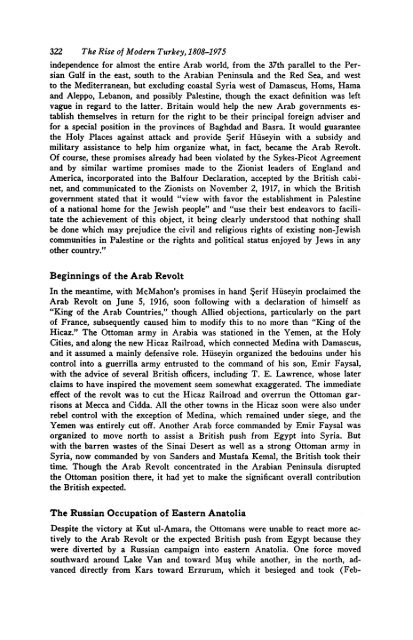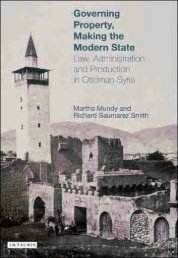The Young Turk Period, 1908-1918 - PSI424
The Young Turk Period, 1908-1918 - PSI424
The Young Turk Period, 1908-1918 - PSI424
You also want an ePaper? Increase the reach of your titles
YUMPU automatically turns print PDFs into web optimized ePapers that Google loves.
322 <strong>The</strong> Rise of Modern <strong>Turk</strong>ey, 1808-1975<br />
independence for almost the entire Arab world, from the 37th parallel to the Persian<br />
Gulf in the east, south to the Arabian Peninsula and the Red Sea, and west<br />
to the Mediterranean, but excluding coastal Syria west of Damascus, Horns, Hama<br />
and Aleppo, Lebanon, and possibly Palestine, though the exact definition was left<br />
vague in regard to the latter. Britain would help the new Arab governments establish<br />
themselves in return for the right to be their principal foreign adviser and<br />
for a special position in the provinces of Baghdad and Basra. It would guarantee<br />
the Holy Places against attack and provide §erif Hiiseyin with a subsidy and<br />
military assistance to help him organize what, in fact, became the Arab Revolt.<br />
Of course, these promises already had been violated by the Sykes-Picot Agreement<br />
and by similar wartime promises made to the Zionist leaders of England and<br />
America, incorporated into the Balfour Declaration, accepted by the British cabinet,<br />
and communicated to the Zionists on November 2, 1917, in which the British<br />
government stated that it would "view with favor the establishment in Palestine<br />
of a national home for the Jewish people" and "use their best endeavors to facilitate<br />
the achievement of this object, it being clearly understood that nothing shall<br />
be done which may prejudice the civil and religious rights of existing non-Jewish<br />
communities in Palestine or the rights and political status enjoyed by Jews in any<br />
other country."<br />
Beginnings of the Arab Revolt<br />
In the meantime, with McMahon's promises in hand §erif Hiiseyin proclaimed the<br />
Arab Revolt on June 5, 1916, soon following with a declaration of himself as<br />
"King of the Arab Countries," though Allied objections, particularly on the part<br />
of France, subsequently caused him to modify this to no more than "King of the<br />
Hicaz." <strong>The</strong> Ottoman army in Arabia was stationed in the Yemen, at the Holy<br />
Cities, and along the new Hicaz Railroad, which connected Medina with Damascus,<br />
and it assumed a mainly defensive role. Hiiseyin organized the bedouins under his<br />
control into a guerrilla army entrusted to the command of his son, Emir Faysal,<br />
with the advice of several British officers, including T. E. Lawrence, whose later<br />
claims to have inspired the movement seem somewhat exaggerated. <strong>The</strong> immediate<br />
effect of the revolt was to cut the Hicaz Railroad and overrun the Ottoman garrisons<br />
at Mecca and Cidda. All the other towns in the Hicaz soon were also under<br />
rebel control with the exception of Medina, which remained under siege, and the<br />
Yemen was entirely cut off. Another Arab force commanded by Emir Faysal was<br />
organized to move north to assist a British push from Egypt into Syria. But<br />
with the barren wastes of the Sinai Desert as well as a strong Ottoman army in<br />
Syria, now commanded by von Sanders and Mustafa Kemal, the British took their<br />
time. Though the Arab Revolt concentrated in the Arabian Peninsula disrupted<br />
the Ottoman position there, it had yet to make the significant overall contribution<br />
the British expected.<br />
<strong>The</strong> Russian Occupation of Eastern Anatolia<br />
Despite the victory at Kut ul-Amara, the Ottomans were unable to react more actively<br />
to the Arab Revolt or the expected British push from Egypt because they<br />
were diverted by a Russian campaign into eastern Anatolia. One force moved<br />
southward around Lake Van and toward Mu§ while another, in the north, advanced<br />
directly from Kars toward Erzurum, which it besieged and took (Feb-












